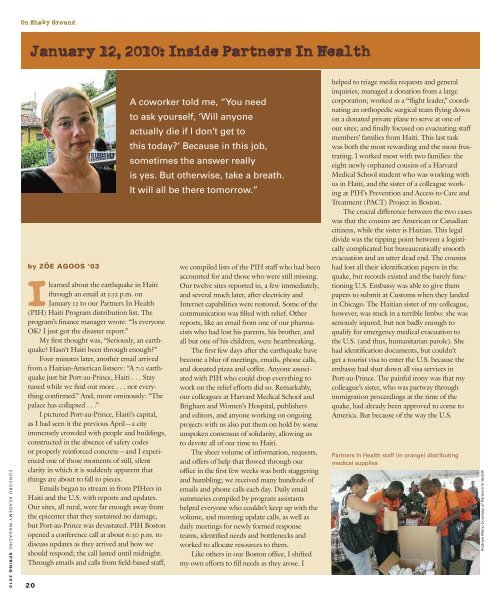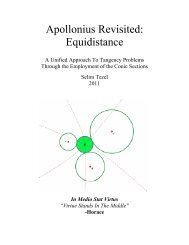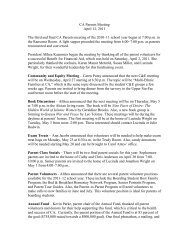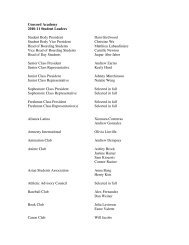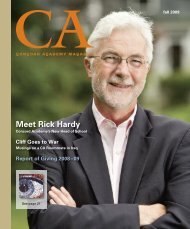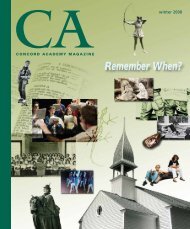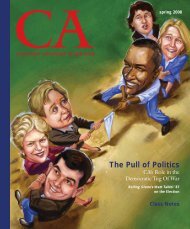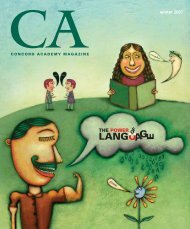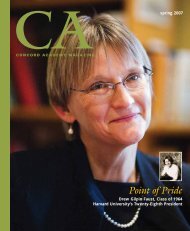Class Notes
S - Concord Academy
S - Concord Academy
- No tags were found...
Create successful ePaper yourself
Turn your PDF publications into a flip-book with our unique Google optimized e-Paper software.
On Shaky GroundJanuary 12, 2010: Inside Partners In HealthC O N C O R D A C A D E M Y M A G A Z I N E S P R I N G 2 0 1 0by ZÖE AGOOS ‘03Ilearned about the earthquake in Haitithrough an email at 5:52 p.m. onJanuary 12 to our Partners In Health(PIH) Haiti Program distribution list. Theprogram’s finance manager wrote: “Is everyoneOK? I just got the disaster report.”My first thought was, “Seriously, an earthquake?Hasn’t Haiti been through enough?”Four minutes later, another email arrivedfrom a Haitian-American listserv: “A 7.0 earthquakejust hit Port-au-Prince, Haiti . . . Staytuned while we find out more . . . not everythingconfirmed.” And, more ominously: “Thepalace has collapsed . . .”I pictured Port-au-Prince, Haiti’s capital,as I had seen it the previous April—a cityimmensely crowded with people and buildings,constructed in the absence of safety codesor properly reinforced concrete—and I experiencedone of those moments of still, silentclarity in which it is suddenly apparent thatthings are about to fall to pieces.Emails began to stream in from PIHers inHaiti and the U.S. with reports and updates.Our sites, all rural, were far enough away fromthe epicenter that they sustained no damage,but Port-au-Prince was devastated. PIH Bostonopened a conference call at about 6:30 p.m. todiscuss updates as they arrived and how weshould respond; the call lasted until midnight.Through emails and calls from field-based staff,20A coworker told me, “You needto ask yourself, ‘Will anyoneactually die if I don’t get tothis today?’ Because in this job,sometimes the answer reallyis yes. But otherwise, take a breath.It will all be there tomorrow.”we compiled lists of the PIH staff who had beenaccounted for and those who were still missing.Our twelve sites reported in, a few immediately,and several much later, after electricity andInternet capabilities were restored. Some of thecommunication was filled with relief. Otherreports, like an email from one of our pharmacistswho had lost his parents, his brother, andall but one of his children, were heartbreaking.The first few days after the earthquake havebecome a blur of meetings, emails, phone calls,and donated pizza and coffee. Anyone associatedwith PIH who could drop everything towork on the relief efforts did so. Remarkably,our colleagues at Harvard Medical School andBrigham and Women’s Hospital, publishersand editors, and anyone working on ongoingprojects with us also put them on hold by someunspoken consensus of solidarity, allowing usto devote all of our time to Haiti.The sheer volume of information, requests,and offers of help that flowed through ouroffice in the first few weeks was both staggeringand humbling; we received many hundreds ofemails and phone calls each day. Daily emailsummaries compiled by program assistantshelped everyone who couldn’t keep up with thevolume, and morning update calls, as well asdaily meetings for newly formed responseteams, identified needs and bottlenecks andworked to allocate resources to them.Like others in our Boston office, I shiftedmy own efforts to fill needs as they arose. Ihelped to triage media requests and generalinquiries; managed a donation from a largecorporation; worked as a “flight leader,” coordinatingan orthopedic surgical team flying downon a donated private plane to serve at one ofour sites; and finally focused on evacuating staffmembers’ families from Haiti. This last taskwas both the most rewarding and the most frustrating.I worked most with two families: theeight newly orphaned cousins of a HarvardMedical School student who was working withus in Haiti, and the sister of a colleague workingat PIH’s Prevention and Access to Care andTreatment (PACT) Project in Boston.The crucial difference between the two caseswas that the cousins are American or Canadiancitizens, while the sister is Haitian. This legaldivide was the tipping point between a logisticallycomplicated but bureaucratically smoothevacuation and an utter dead end. The cousinshad lost all their identification papers in thequake, but records existed and the barely functioningU.S. Embassy was able to give thempapers to submit at Customs when they landedin Chicago. The Haitian sister of my colleague,however, was stuck in a terrible limbo: she wasseriously injured, but not badly enough toqualify for emergency medical evacuation tothe U.S. (and thus, humanitarian parole). Shehad identification documents, but couldn’tget a tourist visa to enter the U.S. because theembassy had shut down all visa services inPort-au-Prince. The painful irony was that mycolleague’s sister, who was partway throughimmigration proceedings at the time of thequake, had already been approved to come toAmerica. But because of the way the U.S.Partners In Health staff (in orange) distributingmedical suppliesAndrew Marx/Courtesy of Partners In Health


